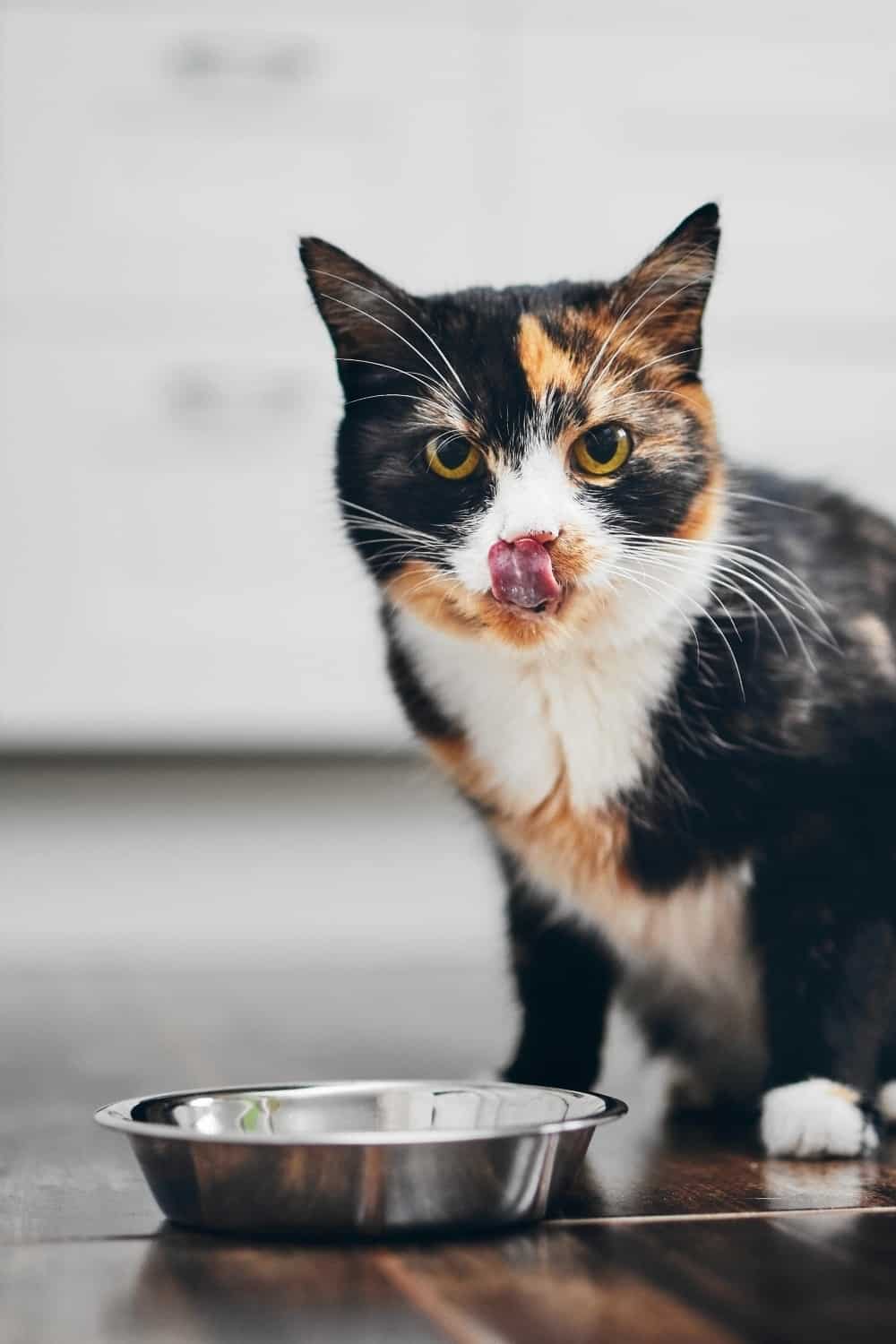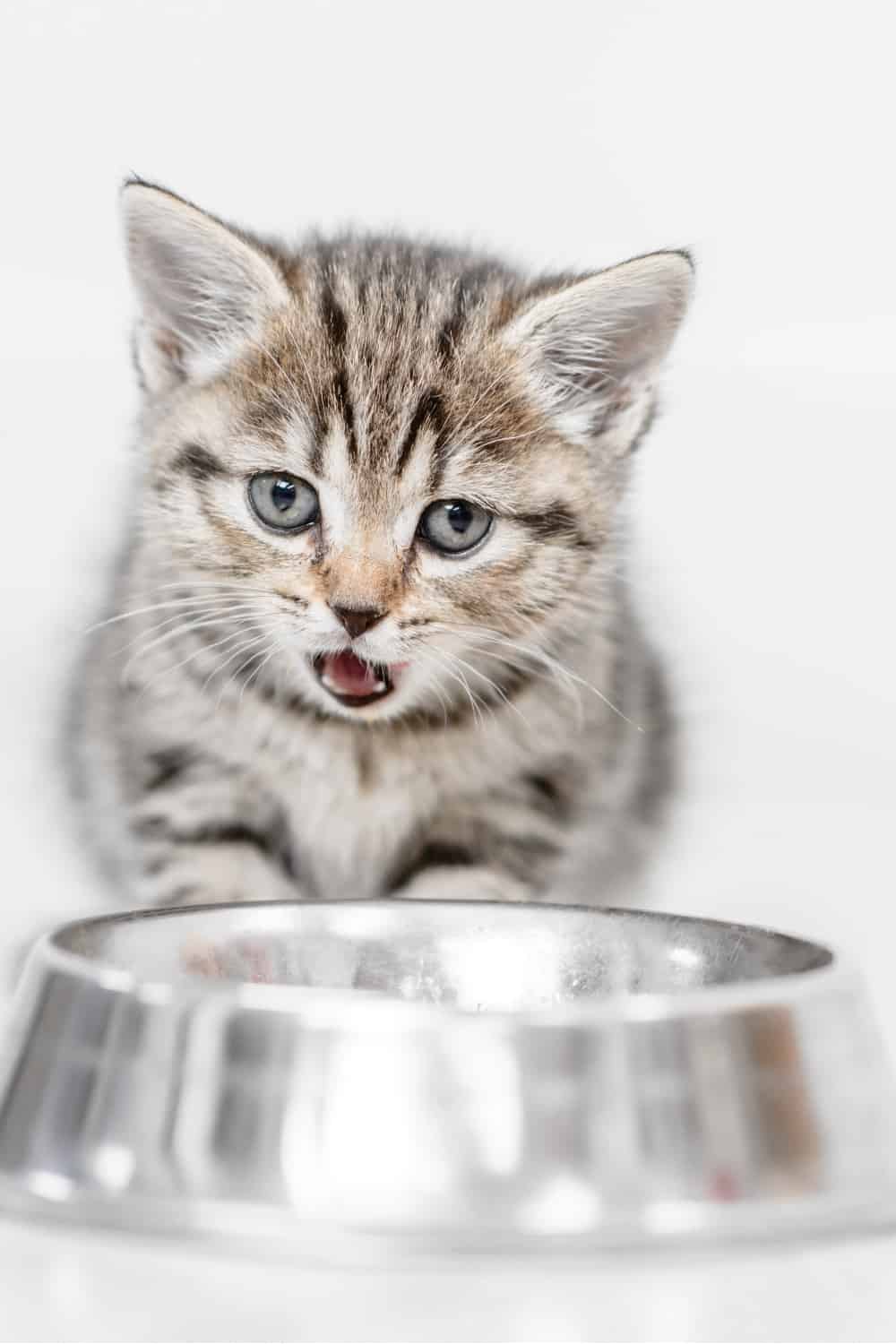Is there a cat that doesn’t enjoy having a tasty meal? I don’t think so. Mealtimes are certainly one of the favorite parts of the day for all the cats I know.
Food is so important for them that it can be used as a positive reinforcement. This means that you can teach your cat some commands and tricks by rewarding them with their favorite treats.
Chances are you hear your cat meowing in some specific situations. This is perfectly natural behavior and could be a way for her to communicate with you.
But, what does it mean when felines vocalize right after a meal?
Why does my cat meow after eating? Does this indicate she lacks something, or that something is wrong with her?
There are seven possible explanations for this feline behavior. Let’s explore them, and see whether you should do something to stop this behavior in your furry friend.
1. Your Cat Is Showing Satisfaction

Your cat meowing just after finishing her meal could be her way of expressing satisfaction.
She just enjoyed the food she likes so much, and now is ready for the rest of her daily adventures.
Some people characterize cats as aloof and hard on showing their emotions. But, I believe every cat owner will disagree.
Cats feel strong emotions and gratitude towards their parents. Your cat is well aware you’re providing her food and everything else she needs every day.
She could show her satisfaction with it by meowing. Also, she could vocalize to express her feelings for you. For instance, you could hear her meowing when you pick her up.
Therefore, if this is the reason for your cat meowing after eating, you have nothing to worry about.
2. She Wants More Food
A cat that’s persistent in meowing after a meal could just want to get some more food.
You should be careful here. First, you need to be sure your cat is getting enough food, divided into a desirable number of daily meals.
Food should be given to a cat in accordance with her age, health, and physical exercise. Make sure you’re changing your cat’s number of daily meals and amount of it following her growth and development.
Our kitty feeding chart by age can be a helpful tool for you here. If you have any doubts about your cat’s diet, you can always ask a vet for advice.
Of course, you shouldn’t allow your cat to stay hungry after having a meal. But, you should be sure that she’s indeed having enough food.
Sometimes your cat will ask for more food, although she doesn't have to be hungry at all. This could become her usual routine and jeopardize her healthy body weight.
Malin Öhlund and his associates [1] found out how greedy eating behavior, together with inactivity, are two main factors associated with feline obesity.
Make sure you don’t leave food available to your pet all the time. Also, encourage her to engage in regular physical activity to keep her at a desirable weight.
3. She Doesn’t Like The Food

Meowing excessively after eating could be your cat’s way of showing her disapproval of the cat food you serve to her.
If you have recently changed your cat’s diet, it's natural for her to feel a bit confused. It may take some time for her to adjust to the change.
You should, however, stick to it, especially in the case this was recommended by a veterinarian.
There’s a chance your cat will continue to protest against that specific diet. This means you could continue to hear her meowing loudly for a long period of time.
You should be patient here since you might need to change a couple of different cat foods until you find the one that suits your pet the best.
4. Attention Seeking
Some cats simply like to get your attention after they have a meal.
Your cat could meow to invite you to pet her or simply snuggle up with her on the sofa. Hill’s Pet describes a cat’s attention-seeking as pulling out all the stops until she gets what she wants.
Besides meowing, cats wanting to get their owners’ attention could exhibit some other behaviors. Some of these include intense staring, interrupting whatever you're doing, and even knocking objects around you.
What should you do in this situation? Well, just give your cat some nice belly pets! Spend time with her and cuddle her as much as she wants to.
Be gentle with the pets since your cat has just eaten. She shouldn’t exaggerate with any physical activity right after eating.
See Also: 9 Explanations Why Your Cat Can’t Meow, Just Squeaks
5. A Cat In Heat

If you have a female cat, excess vocalization after eating could be an indicator she’s in heat.
A cat in heat is fertile and can get pregnant. The first heat usually occurs between 4 to 12 months of age, according to The People's Dispensary for Sick Animals.
Cats can have several heat cycles throughout the year. The most common heat symptoms are meowing loudly and rubbing against everything and becoming extremely affectionate.
To prevent these symptoms in your cat, the only permanent solution is to have her spayed.
Spaying will prevent unwanted pregnancies. Also, it will decrease the possibility of your cat’s excess vocalization.
It’s usually recommended to sterilize cats between four to six months of age. But, you can have your cat spayed even later, just as long as she’s healthy.
6. Stress
A cat under stress could meow after eating.
This means that she doesn’t feel safe and protected in her surroundings. Although she eats, there is still something that’s causing her to feel anxious.
There are plenty of potential stressors for cats, such as the following:
• Any kind of change in their environment
• Conflicts with other cats
• Limited access to outdoors
• Separation anxiety due to their owners being away for too long
• Loud noises such as construction works or fireworks
• Veterinary visits
• New member in their household
• Strangers trying to approach them
You should make sure your home is a safe and warm place for your feline friend. Give her the space she needs, and a place in the house where she’ll have all the privacy.
You should also try to find the exact cause of stress for your cat. Afterward, it’s necessary to eliminate it from your cat’s surroundings.
Consulting a veterinarian for advice is always an option, as some cats may benefit from prescribed anti-anxiety medications.
7. Upset Stomach

A cat meowing after a meal could be dealing with an upset stomach.
This means that your cat is in pain, and is showing this with increased vocalization. PetMD points out how there are also other possible signs of this distress, such as:
• A cat licking her lips
• Reduced activity
• Lethargy
• Hiding in unusual places
If your cat eats too fast, this might cause an upset stomach in her. A good solution here is a slow feeder bowl. With this, your cat will get the food she needs, but she won’t suffer from pain in her stomach.
Besides eating too fast, there are other potential causes of an upset stomach in felines. These could be intestinal parasites, food allergies, kidney disease, or hyperthyroidism.
The most important thing is to detect the exact cause of this health issue in your pet. You should take her to the vet clinic to get concrete answers.
An additional thing to bear in mind is not to feed your cat with your table scraps. Cats get all the necessary nutrients from their food, and human food doesn’t have any nutritional value for them.
Therefore, no matter how cuddly your cat is while asking you to share your meal with her, don’t slack. Her health and well-being should be above all other things.
Summary
Why does my cat meow after eating?
There are a couple of reasons for this behavior, from just showing satisfaction, to dealing with an upset stomach.
You should make sure your cat is having enough food divided into a desirable number of daily meals. If you're positive about this, you shouldn’t give in to her pleas and give her more food. In the long run, this can lead to obesity.
Your cat’s meows could also be about asking for your attention. Make sure you spend enough time with her, play with her, and give her cuddles.
She could be meowing after eating due to stress or an upset stomach. These conditions may require a visit to a veterinarian.
You can always ask for a professional opinion upon noticing some kind of behavioral change in your cat. This is a good way of taking care of your cat’s well-being.
References:
[1] Öhlund M, Palmgren M, Holst BS. Overweight in adult cats: a cross-sectional study. Acta Vet Scand. 2018 Jan 19;60(1):5. DOI, Retrieved September 25, 2023.Read Next: Is Purring Involuntary?





